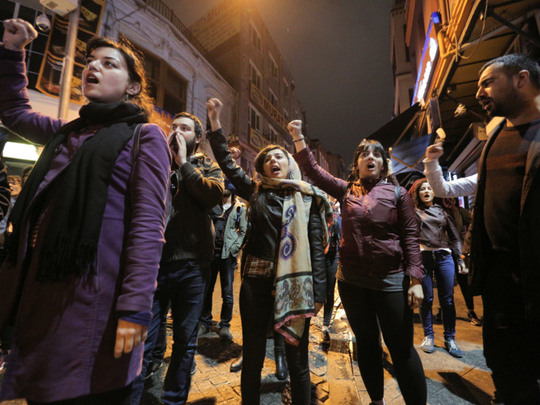
Dubai: Turkish President Recep Tayyip Erdogan won a controversial referendum that gives the president sweeping new powers and put him on the “front seat”. However, the result is not expected to give Erdogan an easy ride in ruling the country particularly that the outcome was too close to call, analysts said.
READ MORE:
Trump congratulates Erdogan on referendum win
The referendum that changed Turkey’s face
Turkish cabinet approves state of emergency extension
Turkish opposition urges board to cancel referendum result
In his speech after announcement of the result, President Erdogan hailed what he described as “historic decision”.
He was quoted as calling the international community and his critics to respect the result and don’t try to “belittle” the outcome of the referendum, saying it will be in vain.
Few hours later, the International observer mission announced on Monday that the late procedural changes in Turkish referendum “removed important safeguard” and fell short of international standards.
'Great achievement'
Meanwhile, analysts, including Turkish political sociologist Ahmet Uysal, described the result as “a great achievement”.
Uysal, former director of Institute of Middle Eastern Studies at Marmara University in Istanbul, told Gulf News the referendum gave Erdogan the public approval to go ahead with “his new system of governing”, Erdogan “is in the driving seat”, he said.
However, Uysal pointed out the vote was too close to call, and that required Erdogan’s efforts to build a wider consensus in Turkey. But “legitimacy is not questionable”, he said.
According to official Turkish news agency, just nearly 51 per cent of the voters said “yes” to the referendum, which will introduce radical changes to the political system of modern Turkey.
The narrow line between the “yes” and “no” in Turkish referendum shows the wide division among the people, political scientists explained.
'Difficult and costly'
Under these circumstances, it will be more “difficult and costly” to rule Turkey, Turkish political scientist, Gokhan Bacik told Gulf News.
“The “no bloc” won a serious momentum. Yet, a large part of the “no bloc” believes that there was an electoral fraud yesterday (Sunday). However, it will be naive to expect that (President) Erdogan would stop.”
Turkish President “faces serious economic and other problems thus he should find out another issue of debate to galvanise its supporters. The debate on the capital punishment could be the next topic,” Bacik said.
Analysts believe Erdogan needs to include the opposition in the decision-making process in the future and build a “wider coalition”, especially that the opposition parties “will prefer polarisation and antagonisation”.
Many from the “no bloc" do come from urban areas, dominate economy and are well educated. They would not immediately start fighting with Erdogan.
“It might be logical for “no bloc” to leave Erdogan to the real politics i.e. inflation, unemployment foreign policy crises,” said Bacik.
Nevertheless, “Turkey is now perplexed”, and the “society is highly polarised”, said Bacik.
“There is a government but it is de facto a dead one. The next election could happen in 2019. Since the system is changed, call for a new election is meaningless. Officially, we have the last prime minister of Turkish republic.”
Political scientists, though differed in the analyses to the result of the Turkish referendum, they agreed in saying that it changed, Turkey, which was founded by Mustafa Kemal Ataturk as a secular, institutionalised country.
Tough test
However, pundits said such a view “should be tested through sociological ways”. The “competition” between Islamists and secularists in Turkey is expected to be seen in the coming years, Bacik said.
Already, the referendum is widening the polarisation in Turkey. The main opposition party, the Republican People’s Party (CHP), called for a recount, denouncing the “violations” in the electoral process.
The pro-Kurdish Peoples’ Democratic Party (HDP), which has had two of its leaders imprisoned under President Erdogan, said the result would not be legitimate until an appeal was finalised.
Supporters of Justice and Development party (AKP), meanwhile, said the party got in 2002 elections the support of nearly 36 per cent of the Turkish people, and that the percentage increased in 2014 to 51 per cent.
Uysal described President Erdogan as “a reformer”, adding that he introduces concepts that people are not used to and later become accustomed to. He said the two sides can make their voices heard in the upcoming elections in 2019.













